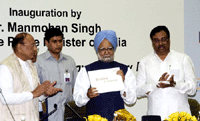|
 The textiles sector has a strategic role in India's industrial economy, the prime minister said today. Addressing the golden jubilee of the Confederation of Indian Textile Industry in New Delhi, Prime Minister Dr Manmohan Singh said, given its widespread dispersal across the country, the textiles industry could be a vehicle for nationwide industrial modernisation and generate large-scale employment, especially close to rural areas. The textiles sector has a strategic role in India's industrial economy, the prime minister said today. Addressing the golden jubilee of the Confederation of Indian Textile Industry in New Delhi, Prime Minister Dr Manmohan Singh said, given its widespread dispersal across the country, the textiles industry could be a vehicle for nationwide industrial modernisation and generate large-scale employment, especially close to rural areas.
''The fact that this industry employs a large female workforce, in semi urban and rural areas, enables it to provide employment to both men and women,'' he said. He said apart from the historical tradition and the availability of skilled manpower, India's inherent strength in the textile sector also comes from the strong raw material base, a capacity for production across the entire value chain, and a large and growing domestic market, apart from the vast potential of the global market. ''In making our textile industry globally competitive, especially in the post-multi fibre agreement regime, our government has focused on three imperatives: one, the need to ensure a stable policy environment; two, the need to support modernization through financing technological upgradation; and, three, to help build global brands for Indian textiles,'' the prime minister said. Dr Singh said, government has the responsibility in three or four important areas of business, like ensuring compliance with tax laws, ensuring compliance with environmental regulations and ensuring adherence to workers' welfare and commitments made to stakeholders. ''This would mean that you would at best have to deal with four or five inspectors or regulators,'' he said. For the rest, he said, the laws of the land should be able to take care of the interests of investors, consumers and workers. Dr Singh said he hoped that working together government and industry could create, ''very quiet political consensus'' in the country that will minimise governmental interference in business activity to these four or five areas and that ''the inspector raj that still stifles enterprise will be thing of the past.'' ''I emphasise this here because our textile industry is operating in one of the most competitive markets today and you must therefore be able to compete with other countries so that you can continue to increase production, generate additional employment at home,''he added. On the strain caused to exporters from the strengthening of the rupee, the prime minister said, ''I am sure you have the enterprise and business acumen to deal with this challenge and improve your competitiveness.'' However, he said the government had taken steps to help mitigate the loss of competitive advantage, while ensuring ''our external economic management is stable and sustainable''. The fiscal measures taken by his government like the transformation of the excise duty structure and reduction of customs duty on machinery import , the dereservation of hosiery and knit wear and the extension of the technology upgradation fund into the 11th Five Year Planhad resulted in India becoming a major outsourcing hub. The challenge ion the 11th Plan was now to increase the skill base to make this sector competitive. In view of its potential to generate new jobs. (See: Full Text of the PM's address at the golden jubilee celebrations of the Confederation of Indian Textile Industry)
|